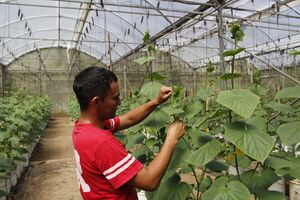
The following coordinate was not recognized: Geocoding failed.
ADES is a social organization, created on March 7, 1993 in the community of Santa Marta, jurisdiction of the municipality of Victoria in the department of Cabañas.
Since its foundation, it has promoted community development and the vindication of Human Rights. Its main area of activity is the department of Cabañas, however, it currently provides support to several grassroots organizations in different departments of El Salvador.
Contents
History
The Santa Marta Economic and Social Development Association (ADES) is a non-profit institution created on March 7, 1993 in the Canton of Santa Marta, Municipality of Victoria, Department of Cabañas, El Salvador. ADES was born from a Committee of Repopulators of Cabañas (CRC) to respond to the needs of the repatriated and resettled communities of the Canton of Santa Marta, a population that, due to the repression of the army, took refuge in Honduras during the Civil War in El Salvador in 1980.
Based on the conditions created with the first return of settlers to Santa Marta from Mesa Grande, Honduras, in October 1987 and the conditions following the signing of the Peace Accords in Mexico in 1992, the possibility of extending the educational and organizational work model to new communities in Cabañas and other departments of El Salvador arose.
Through support in popular training and communication processes, the promotion of organic and sustainable agriculture, respect for the environment, and the vindication of human rights as the fundamental basis for human development, ADES has created alliances that have allowed it to work in San Vicente, Cuscatlán, Usulután, San Salvador, La Unión and La Libertad.
Mission and vision
- ADES is a harmonious and supportive space that contributes to strengthening the conscious participation of communities in improving their living conditions and claiming their rights.
- It seeks to promote emancipatory values that contribute to the emergence of social subjects with critical, reflective, proactive capacity and liberating will who are committed to a full life of social justice.
Strategic objectives
- Strengthen, at an institutional level, the principles and values that underpin the organization's work.
- Consolidate the sustainability and organizational levels of the association.
- Strengthen the organization's contribution to the communities they serve, through a culture based on conscious participation and community organization to improve life and demand rights.
- Strengthen work and relationship strategies with national and international organizations, progressive projects and social movements in Latin America and around the world.

Part of the ADES Santa Marta greenhouse.
ADES Santa Marta Programs
- Community organization and support program: during the 23 years of community work, ADES Santa Marta has been supported by national and international organizations, churches, social groups, with whom, through cooperation and strategic alliances, development initiatives have been carried out in the communities. The areas in which it has been most invested are: education, community organization and popular communication, solidarity economy, health and organic agriculture.
- Sustainable agriculture program: This program supports training processes and the application of production methodologies from an organic agriculture perspective, gradually advancing in the creation of peasant awareness, soil recovery and the implementation of ancestral and more nature-friendly methods. The Sustainable Agriculture program is the internal structure of ADES that motivates a production dynamic that sees the earth as a living being, which also needs signs of respect and consideration as the main basis of life itself.
- Water resources management program: Through the Integrated Water Resources Management Program, ADES supports communities, based on the basin management and master plan approach, in the following processes: identification of potential sources of drinking water, determination of the quality and quantity of the vital liquid, feasibility studies and determination of water recharge zones, preparation of technical files for drinking water systems, training in the administration of community drinking water systems, support in management before public and private entities, and construction of drinking water systems.

